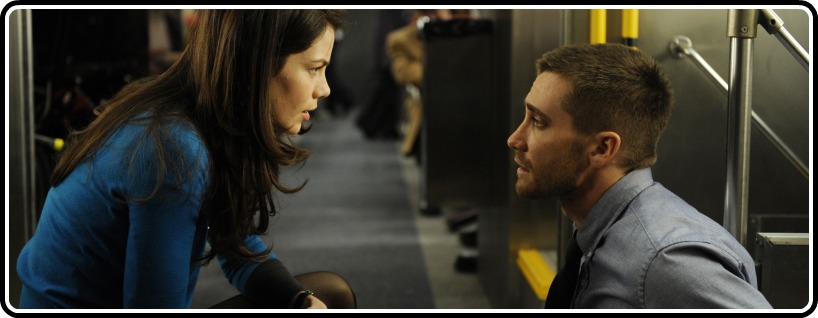With the recent cavalcade of silly, innocuous alien invasion films and bland attempts at philosophically charged science fiction, it’s about time that we get a taut chunk of sci-fi filmmaking. And who better to fit that bill than Moon director Duncan Jones, and his latest film, Source Code?
Source Code follows a soldier, Colter Stevens, who comes to wake up in the body of another man. Confused, he discovers that he is part of a program known as The Source Code, that allows the user eight minutes in the body of another person, after their death. In the hopes of foiling an upcoming bombing plot in downtown Chicago, Stevens must find the bomber of a commuter train before the next one goes off.
After making a splash with the aforementioned Sam Rockwell vehicle, Duncan Jones has become something of a fan boy diety. One of the current kings of the genre, Jones is working on a different level here, one that may or may not jell with fans of his previous work.
The film as a whole is really well made. Beautifully shot, Source Code is a taut action thriller, with many a good set piece, in spite of the fact of the brief time length. The time may indeed be brief, however, there is nothing quite like a ticking clock to amplify the tension within a picture. It’s writing 101. A ticking clock is the ultimate type of narrative gun, and when it goes off, and it does many times here, it’s fulfilling each and every time. Jones gives you really fantastic, contained action within the specific time allotted, and is more than worthwhile, in the face of the seemingly repetitive style of the narrative.
Source Code’s true star here however is writer Ben Ripley. An absolutely fantastic screenplay, there are little to no plot points, big or small, that ultimately don’t pay off in the most worthwhile and fulfilling way. From the tiniest visual note to the biggest thematic element, there is no aspect of this screenplay that doesn’t ultimately pay off to the fullest possible extent.
However, there are also a few issues within the narrative thematically. A weird blend of science, fate, and a ticking clock narrative, the film shifts its tone throughout the film, and while it is quite a commercial piece of science fiction, it does have a jarring sense of tone. That said, throughout the film, while the tone may be a bit all over the place, the way the world is created here, is really great. It’s a wholly believable world, tech, and characterization, and you slowly learn new aspects of this world as the lead does. The pacing here is top notch, and really adds to the tension overall.
Led by Jake Gyllenhaal, the film has a top tier cast, almost all the way through. Gyllenhaal plays our lead, and is the right blend of confused and awkwardly confident and charming, making it a perfect performance given the character written here. Vera Farmiga is convincing as Carol Goodwin, a member of the Source Code team, led by Jeffrey Wright’s cartoonish mad scientist character. Wright is far and away the film’s weakest aspect of this cast, and seems to be ripped right out of a Bond film, campy drawl and all. Rounding out the cast is Michelle Monaghan, but she’s ultimately asked to play the same role, the same way, each scene, so it’s a difficult performance to grade on any sort of scale. It’s a fantastic performance, and you slowly learn more about her, but it’s far from the film’s strongest aspect.
Overall, while the film may not be as inventive, original, or narratively challenging as Jones’ Moon, that’s not necessarily a bad thing. Far more commercial, the film may lack creativity in its narrative, but it more than makes up for it in style, and interesting discussions on fate and a man dealing with the epitome of an existential crisis. Full of great performances, Source Code is a well crafted, taut, and wholly fulfilling piece of pop corn sci-fi filmmaking. Not world shattering, the film also doesn’t look or truly feel like a studio project. It’s simply a special piece of modern science fiction filmmaking.




1 comment